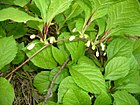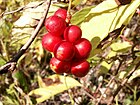Note: This is a project under development. The articles on this wiki are just being initiated and broadly incomplete. You can Help creating new pages.
Schisandra chinensis - Five flavor berry
Schisandra chinensis is a deciduous woody vine and it is native to forests of Northern China and the Russian Far East. The species itself is dioecious, thus flowers on a female plant will only produce fruit when fertilized with pollen from a male plant.
Contents
- 1 Uses
- 2 Parts Used
- 3 Chemical Composition
- 4 Common names
- 5 Properties
- 6 Habit
- 7 Identification
- 8 List of Ayurvedic medicine in which the herb is used
- 9 Where to get the saplings
- 10 Mode of Propagation
- 11 How to plant/cultivate
- 12 Commonly seen growing in areas
- 13 Photo Gallery
- 14 References
- 15 External Links
Uses
Liver disease, High cholesterol, Pneumonia, Cough, Asthma, Sleep problems, Tiredness, Neurasthenia, Chronic diarrhea, Depression, Memory loss.
Parts Used
Chemical Composition
Deoxyschizandrin, γ-schizandrin, wuweizisu C, gomisin N, schizandrin, anwuweizic acid, dihydroguaiaretic acid, tetradecanoic acid, β-sitosterol and daucosterol[1]
Common names
| Language | Common name |
|---|---|
| Kannada | |
| Hindi | |
| Malayalam | |
| Tamil | |
| Telugu | |
| Marathi | NA |
| Gujarathi | NA |
| Punjabi | NA |
| Kashmiri | NA |
| Sanskrit | |
| English | Five flavor berry |
Properties
Reference: Dravya - Substance, Rasa - Taste, Guna - Qualities, Veerya - Potency, Vipaka - Post-digesion effect, Karma - Pharmacological activity, Prabhava - Therepeutics.
Dravya
Rasa
Tikta (Bitter), Kashaya (Astringent)
Guna
Laghu (Light), Ruksha (Dry), Tikshna (Sharp)
Veerya
Ushna (Hot)
Vipaka
Katu (Pungent)
Karma
Kapha, Vata
Prabhava
Habit
Identification
Leaf
| Kind | Shape | Feature |
|---|---|---|
| Simple | The leaves are divided into 3-6 toothed leaflets, with smaller leaflets in between |
Flower
| Type | Size | Color and composition | Stamen | More information |
|---|---|---|---|---|
| Unisexual | 2-4cm long | Yellow | 5-20 | Flowers Season is June - August |
Fruit
| Type | Size | Mass | Appearance | Seeds | More information |
|---|---|---|---|---|---|
| 7–10 mm (0.28–0.4 in.) long pome | clearly grooved lengthwise, Lowest hooked hairs aligned towards crown | With hooked hairs | {{{6}}} |
Other features
List of Ayurvedic medicine in which the herb is used
Where to get the saplings
Mode of Propagation
How to plant/cultivate
Prefers a rich well-drained moisture retentive soil[2]
Commonly seen growing in areas
shade with moist, well-drained soil, Borders of forests and fields.
Photo Gallery
References
External Links
- Ayurvedic Herbs known to be helpful to treat Liver disease
- Ayurvedic Herbs known to be helpful to treat High cholesterol
- Ayurvedic Herbs known to be helpful to treat Pneumonia
- Ayurvedic Herbs known to be helpful to treat Cough
- Ayurvedic Herbs known to be helpful to treat Asthma
- Ayurvedic Herbs known to be helpful to treat Sleep problems
- Ayurvedic Herbs known to be helpful to treat Tiredness
- Ayurvedic Herbs known to be helpful to treat Neurasthenia
- Ayurvedic Herbs known to be helpful to treat Chronic diarrhea
- Ayurvedic Herbs known to be helpful to treat Depression
- Ayurvedic Herbs known to be helpful to treat Memory loss
- Herbs with Fruits used in medicine
- Herbs with Leaves used in medicine
- Herbs with common name in English
- Habit - Herb
- Index of Plants which can be propagated by Seeds
- Herbs that are commonly seen in the region of shade with moist
- Herbs that are commonly seen in the region of well-drained soil
- Herbs that are commonly seen in the region of Borders of forests and fields
- Herbs
- Schisandraceae





